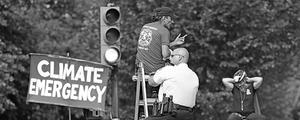PRINCETON, NJ -- Fifty-five percent of Americans worry a great deal or a fair amount about global warming, up from 51% in 2011, but still significantly lower than the previous high of 72% in 2000.
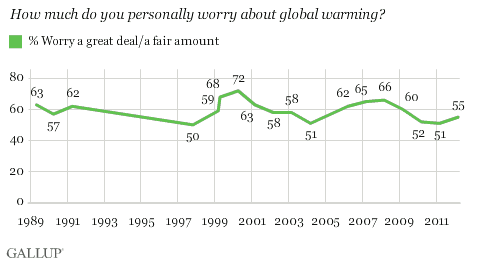
Gallup first asked Americans to rate their concern about "the 'greenhouse effect' or global warming" in 1989, and has measured it as part of the annual Gallup Environment survey every March since 2001. An average of 60% of Americans since 1989 have worried a great deal or a fair amount about global warming, but concern has fluctuated significantly over this time period. After increasing in the late 1990s and rising to a high of 72% in 2000, worry declined to a low of 51% in 2004. It picked up again in 2005, reaching 66% in 2008, before falling again in recent years -- including another 51% reading in 2011.
It is possible that this year's uptick signals the start of a new period of increased worry, but the high level of variability in this trend makes such predictions difficult.
Personal worry about global warming is significantly related to politics and ideology. Democrats and liberals are most likely to say they are worried, while Republicans and conservatives are least likely.
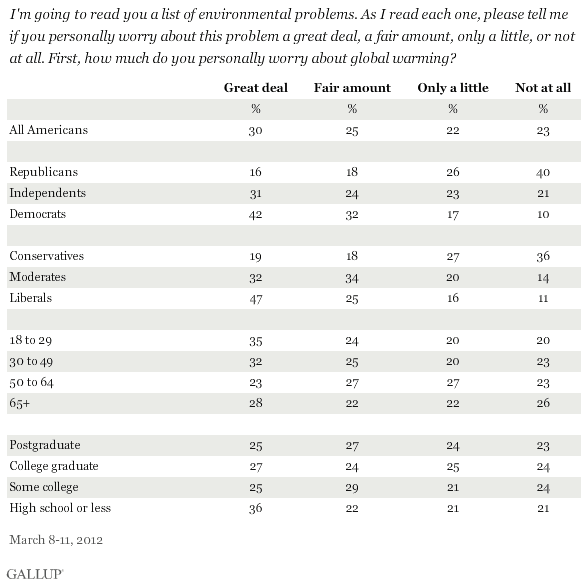
Americans under 50 are slightly more worried about global warming than those who are older. Worry is also slightly higher among Americans with high school educations or less than it is among those with more education.
Most Do Not Expect Global Warming to Threaten Their Way of Life
A different question included in Gallup's March 8-11 Environment survey asked Americans if they thought global warming would pose a "serious threat" to them and their way of life in their lifetime. The 38% who said "yes" is up from last year's 32%, and is about the same as the percentages measured in 2009 and 2010. Worry about the threat of global warming was slightly lower in 1997 and the early 2000s.
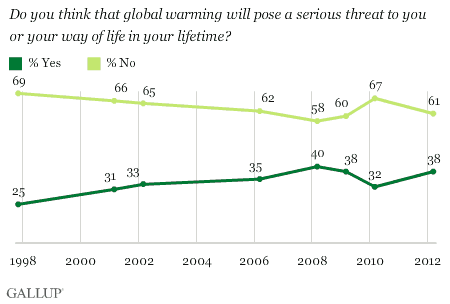
There is a definite relationship between responses to this "lifetime threat" question and age -- perhaps not surprisingly. An average of 46% of those under 50 say global warming will pose a threat in their lifetime; this drops to 33% among those 50 to 64 and 19% among those 65 and older. Those in the oldest age group, of course, on average have fewer years left in their lifetimes in which global warming could potentially be a threat.
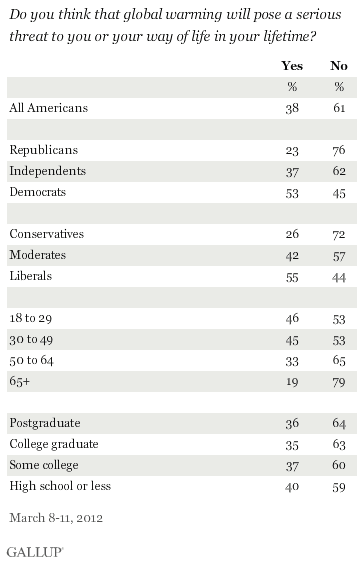
Predictably, these views reflect politics and ideology, with Democrats and liberals most likely to say global warming will be a threat in their lifetime, and Republicans and conservatives least likely. There is little difference in these views by education.
Implications
Americans' worry about global warming inched up this year after declining in the recent past. Both worry and views of global warming as an impending threat have gone up this year. The percentage who worry about global warming is still, however, well below the levels reached in a number of other years, although views of global warming as a threat are now roughly as high as they have been.
The history of Americans' views on global warming is one of significant ups and downs, making it difficult to predict whether this year's uptick in Americans' concerns about global warming will continue in the years to come. It will take much more significant change for Americans' attitudes to reach the levels of just a few years ago, or back in 2000.
Previous Gallup research has documented the strong impact of partisan politics on Americans' views of global warming. Indeed, Republicans and conservatives remain the least likely to say they worry about global warming. This at least partly reflects the global warming skepticism expressed by conservative media news outlets and among conservative commentators. It is difficult to document whether this emphasis waned this past year as the economy and election issues moved more to the forefront.
Survey Methods
Results for this Gallup poll are based on telephone interviews conducted March 8-11, 2012, with a random sample of 1,024 adults, aged 18 and older, living in all 50 U.S. states and the District of Columbia.
For results based on the total sample of national adults, one can say with 95% confidence that the maximum margin of sampling error is ±4 percentage points.
Interviews are conducted with respondents on landline telephones and cellular phones, with interviews conducted in Spanish for respondents who are primarily Spanish-speaking. Each sample includes a minimum quota of 400 cell phone respondents and 600 landline respondents per 1,000 national adults, with additional minimum quotas among landline respondents by region. Landline telephone numbers are chosen at random among listed telephone numbers. Cell phone numbers are selected using random-digit-dial methods. Landline respondents are chosen at random within each household on the basis of which member had the most recent birthday.
Samples are weighted by gender, age, race, Hispanic ethnicity, education, region, adults in the household, and phone status (cell phone only/landline only/both, cell phone mostly, and having an unlisted landline number). Demographic weighting targets are based on the March 2011 Current Population Survey figures for the aged 18 and older non-institutionalized population living in U.S. telephone households. All reported margins of sampling error include the computed design effects for weighting and sample design.
In addition to sampling error, question wording and practical difficulties in conducting surveys can introduce error or bias into the findings of public opinion polls.
View methodology, full question results, and trend data.
For more details on Gallup's polling methodology, visit www.gallup.com.
